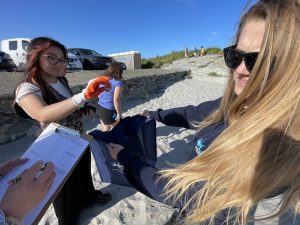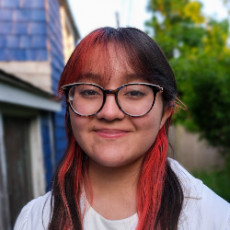
Bella, left, picking up trash on Second Beach in Rhode Island with Sarah Lavallee from Clean Ocean Access.
Composting is a foreign practice to many, which is why I wasn’t surprised to see the struggle of my classmates once I re-implemented a composting program at my school.
I actually understood how they felt, because the year prior I was in the same position. Freshman year of high school one of my classmates started a composting program at our school for their project, and unsurprisingly it was a bit rocky at the start. Students at my school hadn’t considered sorting their waste after lunch because they hadn’t been exposed to that kind of practice before and unfortunately, it’s much easier to throw everything out at once. I understood it to a degree, because my previous schools always recycled and would sometimes have liquid buckets, but It took time for me to get adjusted to it as well.
The importance of the situation is a hard thing to grasp as well. The student who started the program gave us presentations on why composting is important in which they shared the impact of food waste in landfills. Many of us had never even thought about any of our waste in the landfill, and this information resonated with many students. I could feel this motivation from some students who truly wanted to change their impact on the environment. Although at the time this just gave me hope and motivation, the next year it would give me drive, passion and an inclination to take action.
At the start of my sophomore year I started an internship with Clean Ocean Access, which was the same site the student who had started the composting program the previous year was a part of. It was a new path for me so it was a bit intimidating at first, but soon that intimidation was turned into comfort and excitement.
My first day of my internship went great, and proved to be the start of an amazing journey. My first mission was to begin re-implementing the compost program at my school. Going into this task I was confident it was going to be quick and easy, but soon I’d find that it was far from that.
This process began with a lot of communication and back and forth from my school, Clean Ocean Access, and the compost hauling company we’d be working with. Unfortunately, this step became difficult due to lack of communication and elements out of our control. We would discuss something with one person, and we’re told we would have to refer to another person, which was a cycle that repeated many times. This was fine at first, but once we had to contact the person that handled the finances for our school, we came to a standstill. It was hard to get a response from this person, and it made an already difficult situation more difficult. These months of back and forth would lead to the program only being re-implemented for the last half of the school year. Starting something this big into a school can be a taxing process, but being patient and persistent will pay off in the end.
During this long process of starting the program again, I didn’t pause the crucial efforts I needed to commit to in order to prepare my classmates to properly sort their waste. I organized presentations about sorting waste, and the importance of composting. These presentations created a good momentum for the first few weeks, but of course it’s hard to keep high schoolers committed to a practice that is more of an effort than they had to commit to before.
During these first few weeks I would also take the last few minutes of lunch to stand by the compost bin to sort misplaced waste and weigh the waste at the end for our school’s data. This not only benefited our composting program to measure our impact and double check it was properly sorted, but it also gave my classmates the opportunity to ask me questions and I could encourage them to commit to sorting their waste. This process also taught me to be patient and persistent, because with time sorting waste will become second nature to my fellow classmates.
My second priority after starting to re-implement the program was to raise money for the program. I started this task by organizing a fundraiser at the beginning of the school year. This fundraiser was a seasonal one that focused on the impact of pumpkins being mass produced in the country. It was held in November so we could gather the pumpkins that were not used during the Halloween season and have a pumpkin carving event for students and kids in the community.
I began organizing the event by contacting local farms and businesses to see if they expected to have an excess of pumpkins. I contacted business after business and farm after farm, and didn’t have much luck. Fortunately, I kept trying and I soon found two places that would provide me with all the pumpkins I needed. I then started to plan out the logistics of the event with my school’s staff and my mentor at Clean Ocean Access. After I had that all figured out I started to spread the word about the event to my school and to local community organizations. I attend a very small school, so unfortunately I didn’t get a large outcome from my school, but I received many donations from the community organizations I had reached out to. The pumpkin carving fundraiser, or what I called, “Carving for Compost” was a success! We raised over $100 dollars for the program, which in the grand scheme of things may not seem like a lot, but It was a huge success considering we didn’t spend any money on the event itself.
After this fundraising event, I just continued to be persistent with data collection and encouraging my peers to sort their waste. I cannot stress enough how important this step is. Through my internship at Clean Ocean Access I’ve helped my mentor with helping other schools that were starting composting programs, or have had one for a while. Through this work I realized the importance of being persistent with students in teaching about waste sorting.
This importance became apparent to me when I started making connections between how each grade would do with starting a composting program, and how well they would adapt. I noticed that more often than not, the younger grades would do much better with composting than older grades. The elementary school students would often be patient and very receptive to our advice, and older grades were often more stubborn. The element of the situation that solidified my inkling that being persistent with students learning about waste sorting is important was when I began to help the students at a middle school with their program. These students had told me themselves that the younger students did better with composting than the older ones, and they even had the data to prove it.
The conclusion they had come to from that observation was they were better at it because they had started composting in elementary school. Many of those younger students attended an elementary school that had exposed them to composting prior to coming to this middle school. It was clear that because they had already been composting for a couple of years in elementary before coming to this new school, they were used to doing it. This is why I’ve heavily focused on being persistent with my peers.
Although all of this work has been difficult at many times, the outcome is eternally worth it. Through my data collection I’ve found that my school of about 130 students produced over 300 pounds of food waste in 6 months of composting. For four days of our school week only half of the students are in school because we focus on real world learning, or learning through internships at my school. So 300 pounds may not seem like a lot, but considering the size of my school and the amount of students who aren’t in school throughout the week, it is a lot of food waste. This issue is very apparent when you look at traditional public schools, for example, the middle school I worked with had 204 students that produced over 2,000 pounds of food waste this past school year.
If we want to see a better future for our environment come to fruition, we have to take these steps, and composting is an amazing first step.
Posted By Bella Quiroa
Posted Jun 29th, 2023


1 Comment
Iain Guest
July 13, 2023
Hi Bella. This is a wonderful, well-researched blog and it gives lots of great tips and information for students wanting to follow your example. It also shows the value of having a local action group like Clean Ocean Access in support of students and schools. I am currently in Kenya and talking to three schools that want to start composting. They will be so interested to learn from your experience! Great to have you on our team!